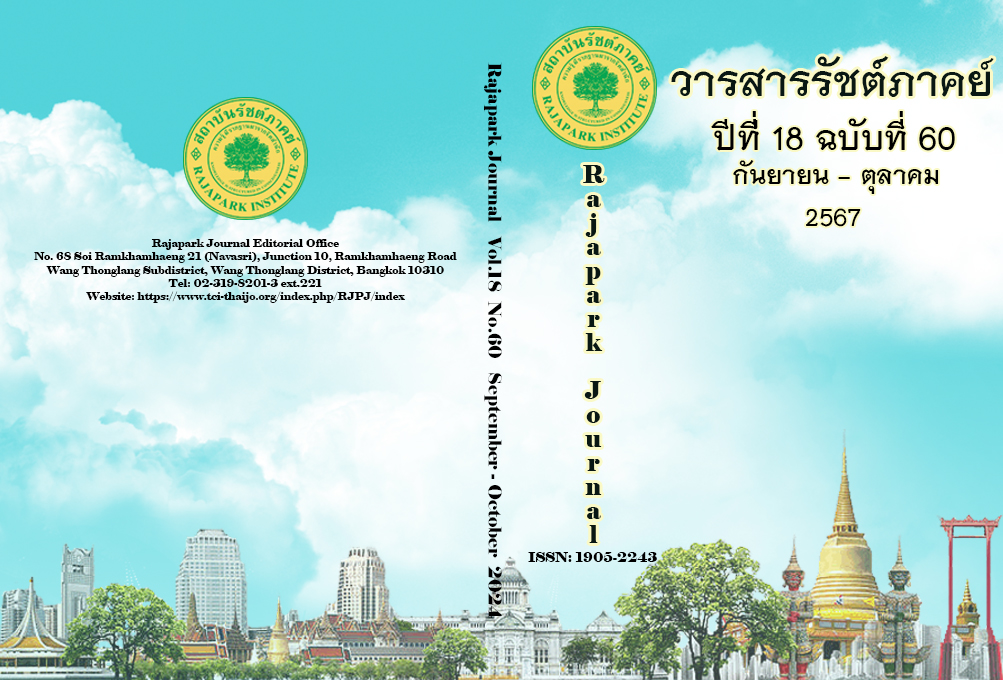Learning Management by Using Critical Inquiry Methods Integrated with Cooperative Learning to Develop Criminology Literacy for Pre-Service Social Studies Teachers
Main Article Content
Abstract
This research aimed to 1) develop learning activities using inquiry-based learning integrated with cooperative learning for pre-service Social Studies teachers, 2) study the effects, and 3) examine the students’ satisfaction. This quantitative research involved a target group consisting of 30 fourth-year students from the Social Studies Teaching Program at the School of Education, University of Phayao, during the academic year 2024. The target group was selected using purposive sampling. The research tools included 1) five lesson plans totaling 15 hours, 2) a 50-item criminology literacy test, and 3) a student satisfaction questionnaire regarding the learning arrangement. Data analysis employed descriptive statistics, including mean, standard deviation, and t-test statistics. The research findings revealed that 1) the developed lesson plans consisted of five plans, each comprising five steps, which are: Step 1: Explore Data; Step 2: Analyze Data; Step 3: Compile Knowledge; Step 4: Check Knowledge; and Step 5: Summary of Knowledge. 2) The students’ post-learning criminology literacy scores were significantly higher than their pre-learning scores at the.05 level, and 3) the students’ satisfaction with the learning arrangement was at a high level.
Article Details

This work is licensed under a Creative Commons Attribution-NonCommercial-NoDerivatives 4.0 International License.
Views and opinions appearing in the Journal it is the responsibility of the author of the article, and does not constitute the view and responsibility of the editorial team.
References
Akers, R. L., & Sellers, C. S. (2004). Criminological theories: Introduction, evaluation, and application. Roxbury Publishing Company.
Bandura, A. (1977). Social learning theory. Prentice Hall.
Boonchuay, S., & Thiraphon, C. (2018). Prevention of child and juvenile delinquency: A case study of the ‘doing good with our heart’ volunteer project of communities around Wat Prayurawongsawas Worawihara. Journal of the Ombudsman, 11(1), 28-55.
https://ombstudies.ombudsman.go.th/ewt_news.php?nid=786
Boonyawinit, M., & Rungchareankiat. D. (2022). The effect of online teaching management in learning with cooperative learning to create innovative solutions online bullying of undergraduate students. Rajapark Journal, 16(49), 194-204.
https://so05.tci-thaijo.org/index.php/RJPJ/article/view/261245
Chatwattana, P. (2021). Creative educational innovations based on experiential learning to enhance education of digital learners. Journal of Industrial Education, 20(1), C2-C9. https://ph01.tci-thaijo.org/index.php/JIE/article/view/243941
Center for Family and Children Policy Knowledge. (2022). Thai children and families in three crises: Annual report on the situation of children and families 2022. https://kidforkids.org/child-family-situation-report-2022/
Chin, C., & Osborne, J. (2008). Students’ questions: A potential resource for teaching and learning science. Studies in Science Education, 44(1), 1-39. https://doi.org/10.1080/03057260701828101
Daiporn, D., Channok, C., Dathong, W., & Chokchaloemwong, D. (2022). A study on the effects of model-based inquiry pedagogy on 21st learning and innovation skills of the students grade 3 in a virtual science classroom. Journal of Education Mahasarakham University, 16(4), 35-46. https://so09.tci-thaijo.org/index.php/JOEMSU/article/view/943
Department of Juvenile Observation and Protection. (2023). Annual case statistics report for fiscal year 2023. https://www.djop.go.th
Dewey, J. (1938). Experience and Education. Kappa Delta Pi.
Facione, P.A. (1990). Critical thinking: A statement of expert consensus for purposes of educational assessment and instruction. The Delphi Report.
Gillies, R.M., & Ashman, A.F. (2003). Co-operative learning: The social and intellectual outcomes of learning in groups. Routledge.
Johnson, D.W., & Johnson, R.T. (1989). Cooperation and competition: Theory and research. Interaction Book Company.
Klinsuwan, M., Pornkul, C., & Lekroungsin, A. (2022). The study on academic achievement through quest-based learning management combined with the use of online applications for students in mathayom year 1, Luang Por Pan Khlong Dan Anusorn School. MBU Education Journal: Faculty of Education Mahamakut Buddhist University, 10(1), 101-113. https://so04.tci-thaijo.org/index.php/edj/article/view/257573
Lertratthamrongkul, W. (2020). Development of web-based instruction using cooperative learning method for information technology law subject to enhance critical thinking skills of the undergraduate students at North Eastern University. NEU Academic and Research Journal, 10(2), 22-40. https://so04.tci-thaijo.org/index.php/neuarj/article/view/242025
Mayer, R.E. (2004). Should there be a three-strikes rule against pure discovery learning? The case for guided methods of instruction. American Psychologist, 59(1), 14-19. DOI: 10.1037/0003-066X.59.1.14
Patsat, A., & Rujiranukul, P. (2019). Guidelines for promoting the social quotient of education students at Rambhai Barni Rajabhat University. Sripatum Chonburi Academic Journal, 16(3), 145-154. https://so05.tci-thaijo.org/index.php/SPUCJ/article/view/240844
Pailom, S. (2020). The study of learning management results and satisfaction primary 4, subject the example citizen for cooperative learning together: LT Model. Journal of Educational Technology and Communication, Faculty of Education Mahasarakham University, 3(7), 125-137. https://so02.tci-thaijo.org/index.php/etcedumsujournal/article/view/242226
Peterson, M. (2005). Intelligence-led policing: The new intelligence architecture. Bureau of Justice Assistance.
Polprapruet, K., & Limprasert, K. (2021). A study of ability in tracing learning management of teacher professional students early childhood program. MBU Education Journal: Faculty of Education Mahamakut Buddhist University, 9(2), 183-193.
https://so04.tci-thaijo.org/index.php/edj/article/view/249790
Ratcliffe, J. H. (2008). Intelligence-led policing. Willan Publishing.
Samutachak, B., & Kanchanachitra, M. (2014). What drives consumerism in Thai Youth. Thammasat Journal, 33(1), 46-69. https://opac01.rbru.ac.th/multim/journal/01635.pdf
Sinthaphanon, S. (2015). Learning management of Teacher for student in the 21st century. 9119 Technique printing.
Slavin, R. E. (1995). Cooperative learning: Theory, research, and practice. Allyn & Bacon.
Suebsurmran, D. (2022). Learning management by cooperative learning for comparing learning skills and satisfaction assessment of elementary school students in Sisaket Province. NEU Academic and Research Journal, 12(3), 211-226.
https://so04.tci-thaijo.org/index.php/neuarj/article/view/254165
Thanyasiri, P. (2021). Knowledge and understanding of people on the role of community justice center to strengthen reconciliation and peaceful culture for Provincial Justice Offices’ Pilot, the Ministry of Justice. Journal of Public Administration and Politics, 10(2), 126-146.
https://so03.tci-thaijo.org/index.php/papojournal/article/view/253562
Traijutakarn, P. (2021). Guidelines for development the juvenile rehabilitation process of the Juvenile and Family Court and Juvenile and Family Procedure Act B.E. 2553[Doctoral dissertation, Thammasat University]. https://digital.library.tu.ac.th/tu_dc/frontend/Info/item/dc:293903
Vygotsky, L. S. (1978). Mind in society: The development of higher psychological processes. Harvard University Press.


